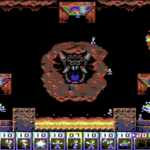The choice for retro gaming enthusiasts continues to expand, with devices available in virtually all form factors. While some prefer authenticity over playability, others are attempting to take retro gaming to a whole new level: atomic.
One example is microByte from Byte-Mix Labs. Launched on CrowdSupply, the microByte basic version is just $45. Already 70% funded (with a $3,750 goal), the ESP32-powered 7.8 x 4 x 1.7 cm condom pocket-sized console features a D-pad, four main buttons, shoulder buttons, and a1.3″ IPS display with a 240 x 240 pixel resolution. That display is barely larger than the average adult male’s thumb.
microByte emulates the following some well-known 8-bit and 16-bit consoles at 60 frames per second:
- GameBoy
- GameBoy Color
- NES
- GameGear
- Sega Master-System
Also promoted as a hack/development device, the crowdfunder page highlights some higher-end games that should run on it, with help:
- Doom I and II
- Wolfenstein 3D
- A proof-of-concept SNES emulator
- ScummVM games
There’s also a work-in-progress Atari emulator. It even has Arduino compatibility.
Small Is Beautiful – But Is It Useful?
On first look, the microByte is an attractive option. With 240MHz core, just 8MB of RAM and 16MB of flash storage it is pleasingly low-fi and as retro as you can get. Sure, it has Wi-Fi and Bluetooth, but they aren’t what lets this project down.
It’s just too damn small.
Ultimately, a retro handheld this big does nothing to encourage retro gaming. It’s sadly little more than a trinket, designed to show what can be built, rather than what should be. It obstructs the discovery of great games. Unless you’re four and have exceptional eyesight, or are desperate for a finger-sized gaming system that doubles as an Arduino, the microByte, sadly, is a waste of time.
I can’t help thinking there could have been a more constructive use of this crowdfunder.
Affiliate Disclosure: Some of the links in this post may be affiliate links, which means I may earn a small commission if you make a purchase through those links. This comes at no extra cost to you. Thank you for your support!
Christian Cawley is the founder and editor of GamingRetro.co.uk, a website dedicated to classic and retro gaming. With over 20 years of experience writing for technology and gaming publications, he brings considerable expertise and a lifelong passion for interactive entertainment, particularly games from the 8-bit and 16-bit eras.
Christian has written for leading outlets including TechRadar, Computer Weekly, Linux Format, and MakeUseOf, where he also served as Deputy Editor.
When he’s not exploring vintage consoles or retro PCs, Christian enjoys building with LEGO, playing cigar box guitar, and experimenting in the kitchen.






